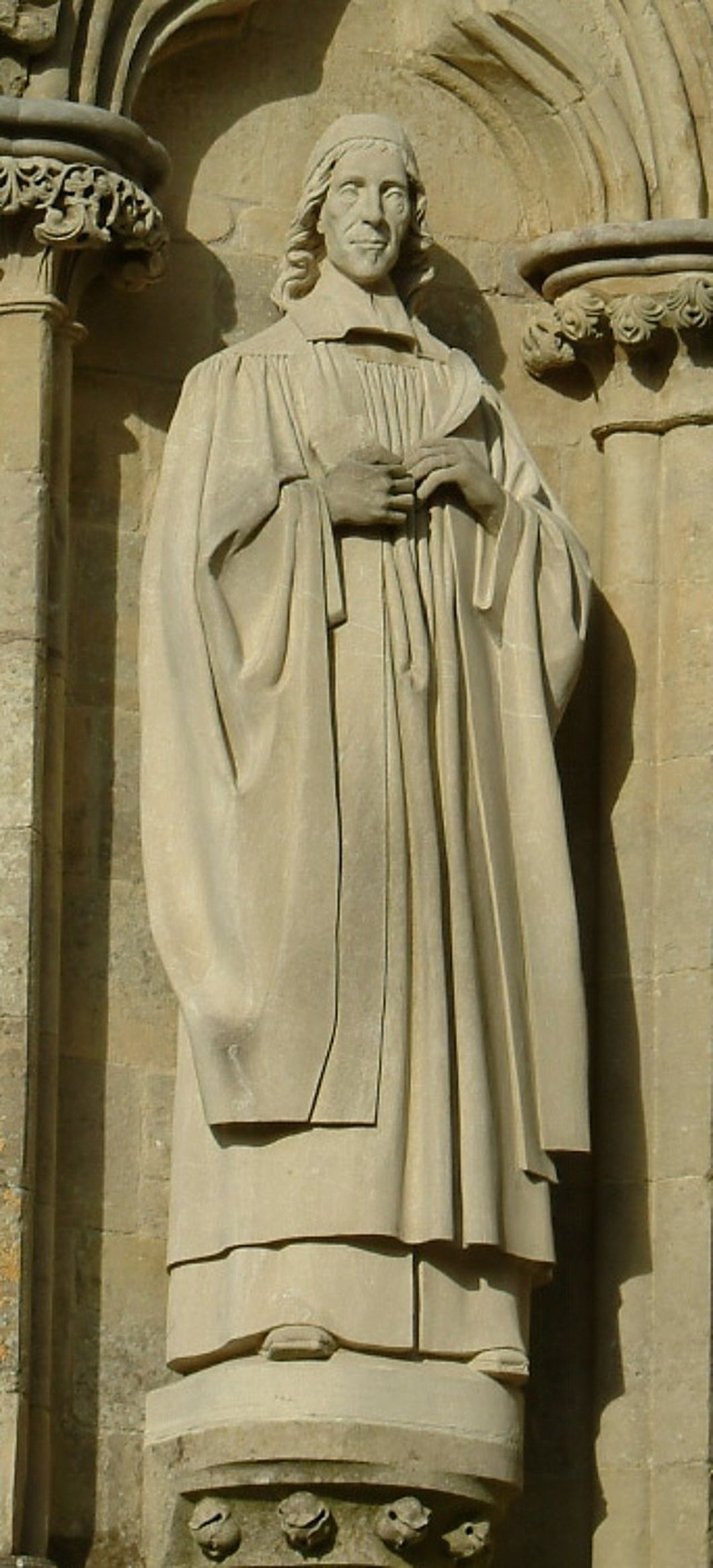If John Donne is the indisputable king of the Metaphysical Poets, George Herbert (1593-1633) occupies a special position of affection in the world of English-language poetry. Like Donne, Herbert was an Anglican priest, and a good amount of his greatest verse is explicitly religious in nature. An example of this is the favorite "Love (III)", known by its opening lines: "Love bade me welcome".
The poem is notable for its marked mellifluous character and because it is a vivid versification of the very important Christian concept of the unworthy soul being loved by God and fed in Holy Communion. This echoes Luke 12:37 and Revelation 3:20 and it fuses these passages with the protestations of unworthiness before Communion exemplified in prayers such as the Prayer of Humble Access and the Domine non sum dignus. This is all sweetened beyond plain imagery of wrath and judgment through Herbert's depiction of Jesus as "Love". The musicality of his words and the sharpness of his imagery make for a good poem, even a great one, and the sentiment within makes the poem is perpetually appealing. He and his fellow Metaphysical Poets have had a rich afterlife of enjoyment by Christians and non-Christians of all stripes, and, in the process, they prove that the greatest religious poetry is great poetry, period.
Thus Ralph Vaughan Williams, an atheist/agnostic who also turned himself into one of the greatest composers of the Anglican choral tradition, composed a choral series setting various poems by Herbert, including "Love bade me welcome."
The Metaphysical Poets influenced Christina Rossetti, who, despite her Italian heritage, was so devoted to Anglicanism that she broke an engagement because of her suitor's Catholicism. Her Christmas poems have been turned into popular carols beloved the world over.
Herbert's influence can also be clearly perceived in the work of Gerard Manley Hopkins; he even quotes "Love bade me welcome" in "The Windhover". Hopkins was one of the greatest Victorian poets and was likely the most innovative. He was also an Anglican convert to Catholicism who became a Jesuit priest.
T.S. Eliot, the epitome of modern(ist) poetry, played a great role in increasing academic respect for the Metaphysical Poets, and, without his exposure to them, his "Four Quartets" certainly would not be the same. In fact, "Four Quartets" strikes right at the heart of Herbert's greatness, because that work blends the legacy of the Metaphysical Poets with Eliot's adolescent adoration of the French Symbolists, while poetry from the Spanish Golden Age of Mysticism is mixed in with Julian of Norwich's pre-Reformation English wisdom. Add in to this the enrichment that Eliot reaped from his familiarity with traditions outside of "the West" (the poem references the Bhagavad-Gita, and Eliot's conception of spirituality was deeply influenced by Buddhism), and you have the perfect embodiment, in a sense, of what religious poetry means in today's world. What we get is (hopefully) not confusion but an increased clarity, borne of greater sophistication and the refinement that naturally comes from exposure to diversity.
My school, Fordham University, is a Jesuit, Catholic institution. It has its own little prayer booklet, and the booklet samples prayers and pieces of religious poetry not only of Catholic origin but also from the wider world of Christianity and beyond. Thus it includes "Love bade me welcome" alongside a poem by Robert Southwell, an English Jesuit martyr whose lifetime just barely intersected with Herbert's and who is thought to perhaps have influenced Shakespeare. If the Jesuits wanted to, they would have every reason to feel nothing but spite for Anglicans. After all, Southwell was just one of many Catholic martyrs of the English Reformation, several of whom were Jesuits. Yet this is not conducive to Christian charity, nor is it consonant with a mature attitude towards intellectual and aesthetic enrichment. Thus, on the steps of the Fordham University Church, one finds a commemoration of Fordham having given an honorary doctorate to Rowan Williams, then Archbishop of Canterbury.
History works in strange ways, and poetry, which we might term the wild and weird underside of history, does what debate cannot do. On its own terms and in its own context it unites warring factions and heals serious divisions through the power of beauty. Creeds are not insignificant; in fact, they are anything but, and no amount of Catholics praying "Love bade me welcome" is going to immediately resolve the intricate legacy of the English Reformation and everything it means for English-language religious poetry. But poetry does in a real sense transcend such things.
Long live poetry's respect for George Herbert, the Anglican whose religious poetry moves beyond Anglicanism and beyond religion into that shadowy region known to our souls as Beauty.




 Today I am
Today I am  Go to the gym
StableDiffusion
Go to the gym
StableDiffusion
 Listen to more music
Photo by
Listen to more music
Photo by  Have more patience
StableDiffusion
Have more patience
StableDiffusion













